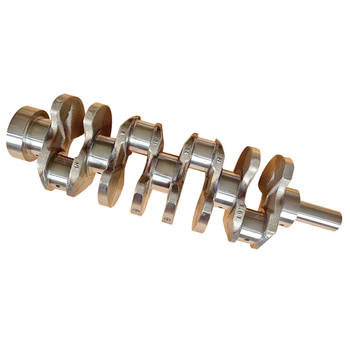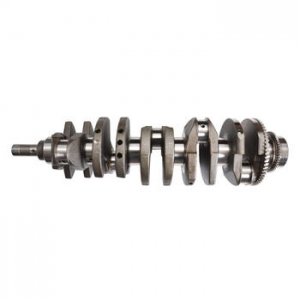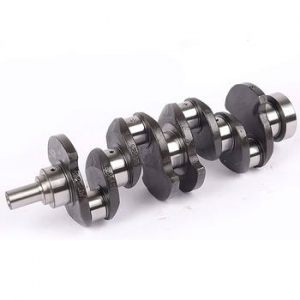
A crankshaft is the backbone of your engine, converting the reciprocating motion of the pistons into rotational energy that powers the wheels. So, what happens if a crankshaft fails? Simply put, it’s a catastrophic event that can completely destroy your engine. It's not just an inconvenience; it's a major mechanical breakdown requiring significant repair or even engine replacement.
The Devastating Consequences of Crankshaft Failure
When a crankshaft breaks or suffers severe damage, the precisely balanced system within your engine is thrown into chaos. Connecting rods can be bent or broken, pistons can be damaged, and the engine block itself can be cracked or even punctured. Oil starvation, due to a ruptured oil passage within the crankshaft, is another common and equally destructive consequence.
Identifying the Warning Signs: Symptoms of a Failing Crankshaft
Recognizing the early symptoms of crankshaft problems can be crucial in preventing complete failure. Listen for unusual knocking or ticking sounds from the engine, especially under load. Low oil pressure, excessive engine vibration, and difficulty starting the engine are also potential indicators of crankshaft issues. If you experience any of these symptoms, immediate inspection by a qualified mechanic is essential.
Common Culprits: Causes of Crankshaft Failure
Several factors can contribute to crankshaft failure. One of the most common is lack of lubrication. Insufficient oil flow or contaminated oil can deprive the crankshaft bearings of the necessary lubrication, leading to excessive wear and eventual failure. Another significant cause is engine overheating, which can warp the crankshaft and compromise its structural integrity. Furthermore, excessive engine stress from high RPMs, heavy loads, or improper tuning can also lead to crankshaft damage. Finally, manufacturing defects, though rare, can also contribute to premature crankshaft failure. What other factors do you think contribute to this issue?
The Cost of Neglect: Crankshaft Repair vs. Engine Replacement
Repairing a damaged crankshaft is a complex and expensive undertaking, often involving specialized machining and balancing. In many cases, the cost of repair can be comparable to, or even exceed, the cost of replacing the entire engine. This often leads to the difficult decision of whether to repair or replace, depending on the severity of the damage, the age of the vehicle, and other factors. Crankshaft repair cost can vary significantly, so obtaining multiple quotes from reputable mechanics is highly recommended.
Preventing the Unthinkable: Proactive Measures for Crankshaft Health
Regular maintenance is the key to preventing crankshaft failure. Adhering to the manufacturer's recommended oil change intervals, using the correct oil viscosity, and ensuring proper engine cooling are crucial steps. Avoiding excessive engine stress by driving responsibly and refraining from aggressive driving habits can also significantly extend the lifespan of your crankshaft.
Dealing with the Aftermath: What to Do If Your Crankshaft Fails
If your crankshaft fails, do not attempt to start or drive the vehicle. Doing so can exacerbate the damage and potentially make repairs even more costly. Have the vehicle towed to a qualified mechanic for a thorough inspection and diagnosis. They can assess the extent of the damage and advise you on the best course of action, whether it’s repair or replacement. Crankshaft damage is serious business.
Beyond the Basics: Understanding Crankshaft Composition and Function
Crankshafts are typically forged from high-strength steel, designed to withstand the immense forces generated within the engine. The crankshaft's journals rotate within bearings, allowing for smooth operation and minimizing friction. Counterweights are strategically placed along the crankshaft to balance the rotating assembly and reduce vibrations. A harmonic balancer, often located at the front of the crankshaft, further dampens vibrations and protects the engine from harmful oscillations.
The Importance of Expert Diagnosis: Don’t DIY Your Crankshaft
Diagnosing crankshaft problems requires specialized tools and expertise. Attempting to diagnose or repair a crankshaft issue yourself without the proper knowledge and equipment can be dangerous and could lead to further damage. Always consult a qualified mechanic for any suspected crankshaft problems.
Next Steps: Protecting Your Engine Investment
What happens if a crankshaft fails is never a pleasant experience. However, by understanding the causes, symptoms, and preventative measures, you can significantly reduce the risk of this costly and disruptive event. Regular maintenance, responsible driving habits, and prompt attention to any warning signs are essential for protecting your engine and ensuring its long-term health. Schedule an engine inspection today to ensure your crankshaft is in optimal condition.

 The Unseen Powerhouse: Unveili
The Unseen Powerhouse: Unveili
 Unveiling the Precision: The A
Unveiling the Precision: The A
 Navigating the World of Cranks
Navigating the World of Cranks
 The Unsung Heroes: What Makes
The Unsung Heroes: What Makes
